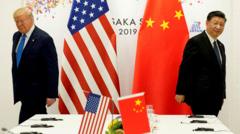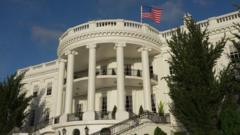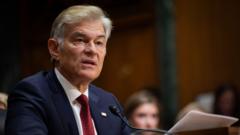The escalating tariff tensions between China and the US are hitting American exporters hard, particularly in agriculture.
**US-China Trade War: no end in sight as tariffs escalate**

**US-China Trade War: no end in sight as tariffs escalate**
China and the US remain locked in a high-stakes battle over tariffs, impacting global markets.
China's recent decision to impose a staggering 34% tariff on all US goods entering its market has created a tumultuous landscape for American businesses aiming to access China's vast consumer base. This latest round of tariffs adds to the existing 10-15% tariffs placed on US agricultural products and could effectively eliminate many American farmers from the competition. Disturbingly, China has demonstrated little concern about finding alternative suppliers for commodities such as chicken, pork, and sorghum, further complicating the situation for American producers, many of whom find themselves politically aligned with President Trump and his base.
Analysts express growing apprehension regarding the worldwide economic ramifications, as the increasing interconnectedness of supply chains means disruptions in one country can swiftly ripple across the globe, leading to a potential international trade crisis.
As both Chinese President Xi Jinping and US President Donald Trump hedge their bets with no indications of conceding, the rhetoric surrounding these tariffs has become increasingly caustic. The timing of Beijing's countermeasures announcement raised further eyebrows, strategically released late on a Friday night during a public holiday, indicating possible intentions to downplay the news domestically while showcasing a resolute stance against US pressure.
While some speculate that there may still be room for negotiation, Xi's public engagement, planting trees with key members of the Politburo during the tariff announcement, radiates a dismissive resolve towards Washington's provocations. Furthermore, as China diversifies its trading partnerships outside of the US, which could ultimately marginalize American businesses and consumers, the perspective on a potential trade deal seems more tenuous than ever.
As both nations grapple with these escalating tariffs, the global economy watches closely, understanding the severe implications might extend far beyond the shores of either country and impact markets everywhere.
Analysts express growing apprehension regarding the worldwide economic ramifications, as the increasing interconnectedness of supply chains means disruptions in one country can swiftly ripple across the globe, leading to a potential international trade crisis.
As both Chinese President Xi Jinping and US President Donald Trump hedge their bets with no indications of conceding, the rhetoric surrounding these tariffs has become increasingly caustic. The timing of Beijing's countermeasures announcement raised further eyebrows, strategically released late on a Friday night during a public holiday, indicating possible intentions to downplay the news domestically while showcasing a resolute stance against US pressure.
While some speculate that there may still be room for negotiation, Xi's public engagement, planting trees with key members of the Politburo during the tariff announcement, radiates a dismissive resolve towards Washington's provocations. Furthermore, as China diversifies its trading partnerships outside of the US, which could ultimately marginalize American businesses and consumers, the perspective on a potential trade deal seems more tenuous than ever.
As both nations grapple with these escalating tariffs, the global economy watches closely, understanding the severe implications might extend far beyond the shores of either country and impact markets everywhere.






















